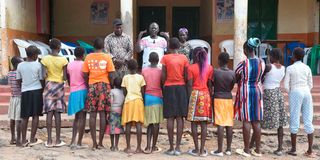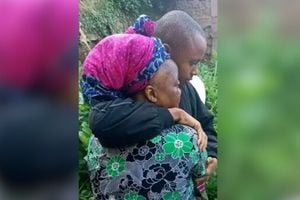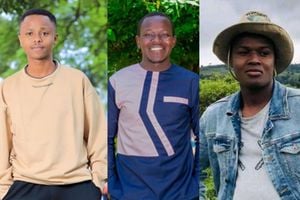‘I was exchanged for eight cows and two camels’: The agonies of circumcised girls in Tiaty

Canon Christopher Chochoi (centre), director of Cana Girls Rescue Home in Nginyang, Tiaty, Baringo County, accompanied by James Cox, a social worker, and Christine Karungole, the centre's matron, addresses rescued girls on December 12, 2024.
What you need to know:
- This Pokot community circumcises girls at the age of 12–15 and marry them off, mostly to old men, ruining the minors' lives from a tender age.
- Female genital mutilation and child marriage remain some of the backward practices among the Pokot and hold back many girls from reaching their full potential.
She twisted the wristband locally made of a hide skin on her feeble hand as she narrated her ordeal after being married off dozens of kilometres away from her home, after forcibly undergoing the archaic female genital mutilation (FGM).
For Chepanga, a 14-year-old from the far-flung Tiaty East, she has nothing to celebrate as her peers in other parts of the country, describing her childhood experiences as a nightmare. When Nation.Africa caught up with her at the Cana Girls Rescue Centre in Nginyang’, Tiaty West, where she had sought refuge a month ago, she said that to begin her life on a new slate, she wanted the wrist band, known as tirim by the Pokot, removed and her hair, smeared with red ochre, shaved.
Tirim is won by newly married women in the Pokot community as an oath that you have entered into marriage. At 14, the firstborn in a family of seven has never stepped into a classroom as she was seen as a source of bride price by her illiterate father, who not only deprived her of basic education but also forced her into the retrogressive female cut.
Her tribulations started some years ago when her father, who had two wives at the time, chased her mother and siblings away. The children had to be raised at her maternal grandparents’ home.
Some years later, his father went to claim her, indicating that she wanted to stay at her step- mother’s house. “I was mistreated and I was not allowed to go to school as my peers. My mother was more than 100km away from where I was. I had to brave the challenges though I was still young,” she said, wiping away tears.
After some years, she couldn't cope with the challenges. She fled from her stepmother’s house to look for her mother and siblings, a walk that took her three days. “I used to walk during the day and in the evening I sought refuge at people’s houses until I reached my destination.”
Her stay with her mother, however, was short-lived as her father went for her in August last year, insisting that she was supposed to stay at her stepmother’s house. Little did she know that he had hatched a plan to have her secretly circumcised in a remote village without her mother’s knowledge. After a month in seclusion, she was married off to a stranger, dozens of kilometres away, after being exchanged with eight cows and two camels as reverse dowry.
The allure of getting dozens of livestock as bride price for a circumcised girl as compared to less for the uncircumcised ones continues to push parents to engage in the harmful practice as a way of increasing their livestock. Among the Pokot, for instance, female circumcision is part of a traditional ceremony, which marks a girl’s transition into womanhood, and young girls are forced into arranged marriages in exchange of bride price in the form of livestock.
“A month after being in seclusion, I went to my stepmother’s house, only to find a stranger who was introduced as my husband. I was told I was supposed to go with him to my marital home that particular day. All this while, my mother, who was far away, was not aware of what I was going through. At a tender age, I was made someone’s wife against my will just because I am a woman and viewed as a source of [reverse] dowry,” Chepanga narrated painfully.
“I was tormented, deprived of basic education, separated from my mother at a tender age and circumcised against my will and without the knowledge of my mother. To worsen the situation, my father married me off to a stranger in exchange for eight cows and two camels.”
To cement the marriage as was the norm, her husband put tirim on her hand as a sign that she was now his wife and should not break the oath. At her marital home in the far-flung village bordering Baringo and Turkana counties, she said livestock theft and bandit attacks are so rampant and men are required to keep vigil at night to ward off any intruder.
On her first day in the village, she was left alone in the house at night as her ‘husband’ went with his peers to man the borders. “I was so terrified, considering that the village was more than 100km from where my mother was and I couldn’t trace my way back. Being an insecure area, I could not also walk anyhow. I had sleepless nights as I was left all alone.”
Two weeks later, she could not cope with marital duties and she made an ultimate decision to escape to Chemolingot police station, tens of kilometers away, to air her grievances and be rescued. “I walked for three days to Chemolingot police station and I was later brought to the rescue centre by the children’s officers. I am happy now that I am in a safe haven and I yearn to be enrolled in school and get education like my peers. I don’t want to go back home until I complete my education because they will take me back to my husband. I want to be a doctor and educate my younger siblings.
“This tirim is a sad reminder and I want it removed and my hair shaved as well. I was donned by my supposed husband as a sign of a marriage oath. I want to start life afresh and be like other children I am seeing here,” she said.
The situation is the same for Chepterit, another 14-year-old girl from far-flung Tiaty East, who was also forced to undergo the female cut and married off to a sickly old man. She had gone to school but was forced to drop out in Standard Three, on the pretext that she was a girl and was not supposed to be educated. To prove his point, his father said she was supposed to take care of his goats until she was ripe for marriage.
“I had no other choice but to obey. I was turned into a herder at barely eight years old, a responsibility I did until August last year when I was forced to undergo the cut and was married off to an old epileptic man,” said the teenager, amid sobs.
“Two months later, I fled my husband’s home and trekked for more than 50km to Chemolingot Primary School, which was also serving as a rescue centre. My brothers trailed me after getting wind of where I had fled to. I was taken to the children’s office that handed me over to this facility.”
She is now elated that she is safe at the rescue centre, and wants to continue with her schooling and achieve her dream of becoming a teacher. “All my four brothers were enrolled in school, but my younger sister and I were turned into herders just because we are girls, and due to archaic cultural practices in our community, we are a source of wealth and do not deserve such rights.”
According to a chief from Tiaty East who sought anonymity for fear of victimisation, men in the community are supposed to accumulate hundreds of livestock just for prestige, mostly dowry obtained after marrying off their young girls, and women are not allowed to sell even a single animal to cater for basic necessities, a situation that has led to high poverty and illiteracy levels in the area because children do not go to school.
Read: Meet Samuel Lolkitekui, retired police officer leading fight against harmful practices in Samburu
“After the initiation ceremony, the circumcised girls, mostly aged 10–13, are secretly married off to ageing men in exchange for [reverse] dowry, with the numbers depending on the villages. Some get as many as 50 cows. Sadly, the [reverse] dowry is not shared with women, but the men accumulate them to marry more other wives.
“The circumcised daughters are seen as cattle to be sold and bride price would typically be counted in terms of livestock and no one will even negotiate bride price for uncut girls because they are seen as raw and not complete women,” the chief added.
FGM is rampant in August and December holidays, with the culture deep-rooted in the remote villages of Ng’oron, Kolowa, Kakapul, Gulel, Atirir, Kongor, Nyakwala, Silale, Kositei, Akoret, Akwichatis, Toplen, Nasorot, Riong’o, Churo, Tangulbei, Paka and Natan.
James Cox Arimonyang, a social worker at the facility, said they rescue girls from the female cut, early marriages, defilement and child labour. “The total population in this facility is currently 59. We received five new cases of FGM, forced marriages and child labour some weeks after schools closed. Harmful practices are still rife in this community (Pokot), especially in the far-flung villages. Women and girls are viewed as lesser beings and are only regarded as sources of wealth and do not deserve to go to school whatsoever. They are purposely meant for marriage,” he said.
“This community circumcises girls at the age of 12–15 and marry them off, mostly to old men. About 30 per cent of girls in this region have gone to school, a clear indication that illiteracy level is still high. We are appealing to the state to intervene and protect every child’s right to education.”
Rtd Canon Chochoi, the director of the Cana rescue centre started in 2006, said despite the government’s push to end FGM by this year, the practice is still prevalent in Tiaty, especially in the far-flung villages. “I receive girls from the region who flee from female cut and early marriages every week, an indication that the vice is still rife in the community. The situation has been worsened by high illiteracy and poverty levels, where parents see girls as a way of getting more livestock.”
According to the priest, in this community, uncircumcised girls are considered ‘unripe’ and are outcasts who cannot be allowed to mingle with the girls who have been mutilated. In many settings where FGM is practised, it is justified because there is a social consensus that if households or individuals do not perform the practice, they risk being excluded, criticised, stigmatised or the household would not find a suitable partner to marry their daughters.
The region records high cases of FGM and early marriages during school holidays. Hundreds of girls aged 10–16 are always subjected to FGM.





